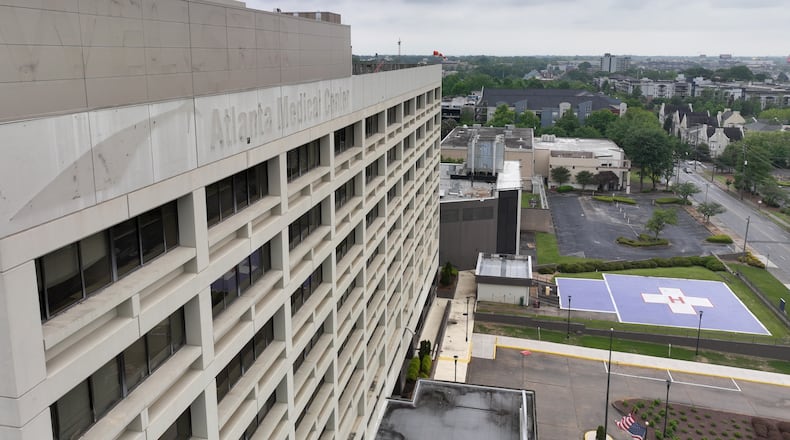One year has passed since Atlanta Medical Center’s last patients left the emergency room Oct. 14, 2022, shortly before Wellstar Health System closed the hospital for good, disrupting the city’s health care ecosystem.
As the Atlanta City Council prepares to vote on extending a moratorium prohibiting new development on the now-empty hospital site, life has moved on for the hundreds of AMC’s doctors and thousands of patients. But that life is different, and researchers say for some patients, it will likely be shorter.
For the past year, Grady Memorial Hospital and other nearby facilities have stretched their resources to absorb AMC’s patients and maintain their care. Mercy Care, an outpatient clinic serving the homeless a few blocks from the former AMC, also saw patient visits jump. Doctors who once worked with AMC got other jobs or retired, and their patients scattered.
According to recent studies on hospital closures by Harvard University researchers, in the initial years after a hospital closes, patients at the newly stressed nearby hospitals die who would not have died otherwise. Their research has found 2.3 additional deaths for every 1,000 patients.
It may never be possible to tease out the exact results in Atlanta, because the closure coincided with other complicating factors: Leaders were starting to invest in an already thin safety net health system; the city’s population was growing; and COVID-19 had turned normal patient habits and health resources upside down.
Long-term impacts
Dr. Tawian Livingston, an internal medicine doctor who served Wellstar patients at a southwest Atlanta practice that referred patients needing hospital care to AMC, has seen the loss of care play out in Atlanta from another angle. He and his practice partner, Dr. Cassandra Treadway, practiced internal medicine in southwest Atlanta, and were among hundreds of office doctors who moved, retired, or were shut down with the AMC closure.
“In one swoop, you eliminated a large percentage of primary care doctors in an area that was already suffering,” Treadway said.
Livingston and Treadway recently resumed seeing patients in the same area through a partnership with Morehouse School of Medicine’s health care arm, Morehouse Healthcare. They say many with chronic conditions that need vigilance have lost months of routine care, however.
“What we found was when we left, patients couldn’t get in to see anybody,” Livingston said. “So, someone’s diabetes that was well controlled, when we saw them again in a year, was out of control.”
Soroush Saghafian, director of the Public Impact Analytics Science Lab at Harvard University, said such examples illustrate a slippery slope that can lead to a few extra deaths.
His team studied what happens to nearby hospitals after a hospital closes but did not study AMC specifically. They looked at the average effect in both urban and rural settings across the United States. Saghafian and his team found that once patients go to other hospitals, it takes a few years for those hospitals to build the staffing and infrastructure needed to manage the displaced patients.
“There are consequences,” Safghanian said. His research showed, for every 1,000 people discharged from the hospital, the number of deaths rise by about 2.3 on average.
“People who wouldn’t have died, unfortunately, we see that they die,” he said.
Absorbing patient needs
Michael Nolan, who works with the homeless for the nonprofit Intown Cares, believes the evidence is there for harmful disruptions in care. In the year since the closure, he and his medical team have sent three patients to Grady’s ER for immediate cardiac monitoring and possible treatment, only to learn they eventually left without getting diagnosed.
For a vulnerable population used to hearing “no,” longer waits to be seen and stumbles at check-in are discouraging, he said. “It’s kind of a perfect storm.”
Dr. Gray Norquist, who oversees mental health care at Grady Health System, guesses that of the 850 to 1,000 mental health patients who come to Grady’s emergency room every month, about 100 are there because AMC has closed.
“No one is happy when you find out one of the other providers in your local area is going to close, which means that more people are coming over, and we were already busy,” Norquist said. However, he said he believes the system is absorbing the influx, with mental health needs met at walk-in clinics and community based programs as well as some soon-to-open new beds.
“We are discharging people probably sooner than we would like, but that means we’ve ramped up our more intensive case management services and trying to follow people more closely than we have in the past,” he said. “I would just say I feel very fortunate in that Grady has stepped up.”
Catching up to new demands
It may never be possible to measure the true impact of the loss of AMC because at the same time it closed, Grady was already in the process of expanding to cope with overflowing patient loads, with a new surgical tower funded by private donors, and Fulton and DeKalb counties.
Following the news that AMC was closing, Gov. Brian Kemp used some of Georgia’s federal pandemic funds for a one-time allocation to Grady of $130 million. Later this month, Grady will start putting patients into the first of 182 new beds that money paid for, including a 16-bed unit for psychiatric patients who also need medical treatment.
DeKalb County chipped in as well: $20 million for increased services at both Grady and Emory Hillandale Hospital.
It’s still not clear where the ongoing operating funds will come from in future years to provide nurses and doctors to staff all of those beds.
Mercy Care has hired new clinical leaders to ramp up care, and has filled 10 of 35 idle positions for clinical workers. “I do think Mercy Care is well positioned” to meet its mission, said its new chief medical officer, Dr. David Holland.
Wellstar has proposed no plans for a new health-related facility on the AMC site, and the city’s own efforts to return health services to the site have so far not panned out. Without that, Atlanta Mayor Andre Dickens recently told the AJC he will renew his ban on development for another six months, blocking Wellstar from selling or redeveloping the land. City Council members could vote to extend the ban as soon as Monday.
Wellstar is focused on other plans, especially building a new hospital in an affluent area near Augusta and rescuing the state’s existing safety net hospital in that city.
A spokesman for Wellstar, Matt O’Connor, last week reiterated the health system’s previous statements that it did what it could to help its AMC patients transfer to new care. Regardless of the moratorium, he said, “We’re committed to a thoughtful process” for what comes next for the property.
Some public officials who last year joined Dickens in denouncing Wellstar’s sudden announcement of the AMC closing are now more muted. The AJC reached out to the office of US. Rep. Nikema Williams, whose Atlanta district includes the downtown AMC location, for comment for this story, but heard nothing back.
Williams in 2022 joined U.S. Sen. Raphael Warnock in writing Wellstar with their “deep concern” at the impending AMC closure and asking them to reconsider.
For his part, Warnock in a recent interview suggested Wellstar’s efforts in Augusta were a positive counterweight. “I think that I want to continue to hold hospitals accountable while at the same time supporting our hospitals,” he said.
A downtown community leader, Central Atlanta Progress President A.J. Robinson, said he can only wait and see what happens at the Old Fourth Ward site.
”I’m hopeful somebody will come along,” to strike a deal including some kind of health facility on the property, Robinson said. “But I just haven’t heard of anyone yet.”
The Atlanta Journal-Constitution and Report for America are partnering to add more journalists to cover topics important to our community. Please help us fund this important work at ajc.com/give
Keep Reading
The Latest
Featured




